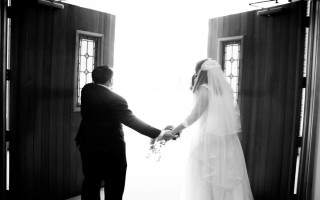 A couple of years ago, when I celebrated Confirmation at a large, working-class Hispanic parish in our Archdiocese, I was quite edified by two of the young confirmandi, who shared reflections on what their Confirmation meant to them. They said that their Confirmation gave them the grace to go forth and “build a civilization of truth and love.” I could not have said it better myself! Truth in love: the foundation of civilization. Both are necessary, both together, if we wish to have a flourishing society: truth and love.
A couple of years ago, when I celebrated Confirmation at a large, working-class Hispanic parish in our Archdiocese, I was quite edified by two of the young confirmandi, who shared reflections on what their Confirmation meant to them. They said that their Confirmation gave them the grace to go forth and “build a civilization of truth and love.” I could not have said it better myself! Truth in love: the foundation of civilization. Both are necessary, both together, if we wish to have a flourishing society: truth and love.
In “Truth in Love,” Pope Benedict XVI’s encyclical on Catholic social teaching, he elaborates upon a theme that his predecessor, St. John Paul II, articulated in his social encyclical Centesimus Annus regarding the need “to safeguard the moral conditions for an authentic ‘human ecology’” (n. 38). Pope Benedict says:
It is contradictory to insist that future generations respect the natural environment when our educational systems and laws do not help them to respect themselves. The book of nature is one and indivisible: it takes in not only the environment but also life, sexuality, marriage, the family, social relations: in a word, integral human development. Our duties towards the environment are linked to our duties towards the human person, considered in himself and in relation to others. It would be wrong to uphold one set of duties while trampling on the other. Herein lies a grave contradiction in our mentality and practice today: one which demeans the person, disrupts the environment and damages society (n. 51).
Pope Francis also continues to build upon this insight into human ecology that his predecessors bequeathed to us. In his own social encyclical, Laudato Si’, he emphasizes this human ecology and describes the interconnectedness of all of creation:
Learning to accept our body, to care for it and to respect its fullest meaning, is an essential element of any genuine human ecology. Also, valuing one’s own body in its femininity or masculinity is necessary if I am going to be able to recognize myself in an encounter with someone who is different. In this way we can joyfully accept the specific gifts of another man or woman, the work of God the Creator, and find mutual enrichment. It is not a healthy attitude which would seek ‘to cancel out sexual difference because it no longer knows how to confront it’ [n. 155].
Indeed, this male-female complementarity is stamped in all of creation: “male and female he created them” (Gen 1:27). A year before Laudato Si’, in an address to the participants at the International Colloquium on the Complementarity between Man and Woman sponsored by the Congregation for the Doctrine of the Faith in the Vatican, Pope Francis said the following:
Marriage and the family are in crisis today… The crisis of the family has produced a human ecological crisis, for social environments, like natural environments, need protection. Although humanity has come to understand the need to address the conditions that threaten our natural environment, we have been slow — we have been slow in our culture, even in our Catholic culture — we have been slow to recognize that even our social environments are at risk. It is therefore essential that we foster a new human ecology and make it move forward (n. 2).
From Sacred Scripture, from the teachings of the recent popes, indeed, from observing all of creation, it becomes clear that the complementarity between man and woman is at the heart of this “new human ecology.” This is also conventional wisdom learned from millennia of human experience: as goes marriage, so goes the family; and as goes the family, so goes the society. To properly order our society, we must begin—not end, nor stop at, but begin—by appreciating and esteeming the meaning of the complementarity of man and woman, and therefore fostering the institution of marriage in society so that children may know and be loved by their mother and father. This is a foundational good, not just for the children, not just for the family but for all of society. Marriage is the only institution that does this, that connects husbands and wives to each other and to any children who come from their union.
The civilization of truth and love is a legacy we have received from our ancestors in the faith. It is now our turn to continue this legacy, especially with regard to the good of marriage, which is in crisis today and is a foundational good for the flourishing of society. We do this above all by the witness of our lives, which comes from living our personal vocation and common Christian vocation well and faithfully. May God grant us this grace, for his glory, for the sanctification of his people, and for the common good of society.
Most Reverend Salvatore J. Cordileone is the Archbishop of San Francisco and chairs the USCCB’s subcommittee for the Promotion and Defense of Marriage.
This article was orignally on page 11 of the printed edition.
